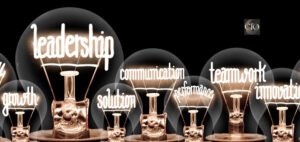Tides of Influence
In the modern, fast-paced business landscape, profitability alone is no longer the sole determinant of leadership excellence. Companies that have aligned their ethical principles and contributions to society within their central mission are experiencing greater culture, participation, and performance. The article examines the development, dynamics, benefits, and application of purpose-driven leadership excellence in business, drawing on recent research and real-world practices.
Understanding Purpose‑Driven Leadership
Purpose-driven leadership is a term referring to making organizational purpose central to decisions and the culture. This leadership style focuses more on vision rather than control or centralized decision-making and coordinates individual goals with those of the company in a mission that transcends the direct ROI of financial investments. It also facilitates leadership excellence in corporate affairs as it encourages employees towards personal attachment to the larger cause.
Why Leadership Excellence in Business Now Demands Purpose
A recent McKinsey survey found that 82 % of employees see purpose as a core business requirement, and 72 % recognize it as a business priority rather than the generation of revenue. Organizations such as The Body Shop or B-Corp-certified organizations apply leadership excellence to the areas of business by incorporating purpose into strategy, culture, and governance.
Benefits of Purpose‑Driven Leadership Excellence in Business
Employee Engagement & Retention
When values and work are aligned, engagement is high. Purpose-aligned organizations have reduced turnover and increased organizational morale. This is a characteristic of organizational leadership.
Innovation & Performance
Purpose-driven companies witnessed up to 40% higher retention and 30% more innovation than competitors. These companies continually portray business leadership excellence through innovative, mission-driven cultures.
Stakeholder Trust
Transparency and business ethics in leadership ensure that there are better relationships with customers, communities, and investors. Business plans that stick to their principles and are not subjected to either political or economic influences tend to perform over the long term.
How Purpose Enhances Leadership
Clarity & Communication: Leaders who are purpose-driven provide clear descriptions of the mission and relate it to the roles of the individuals. This fuels alignment and creates coherence.
Authenticity & Integrity: Leaders who practice what they preach will create trust and set examples that are followed by others, which is a critical characteristic of being an excellent leader in business.
Emotional Intelligence & Empathy: Through attunement and appreciation of employee sources of motivation, purpose leaders foster psychologically safe situations where innovativeness and engagement thrive, these characteristics of enduring leadership exceptionalism within business.
Strategic Alignment: Purpose guides every decision, be it partnership, client policies, and more. This structured method supports business leadership skills and prevents mission drift.
Real‑World Examples
- CECP research found that during crises like the COVID-19 pandemic, companies with a strong sense of purpose were valued at multiples up to four times higher than those of companies with weaker or less-defined purposes.
- Tiger Recruitment, with its B-Corp certification and values-driven governance, is an excellent example of how excellence in business leadership is nurtured when ethical purpose drives daily work and culture.
- Bambuddha Group, led by Anna Sheppard, integrates social change and compassion into various leadership theories. This approach has influenced international companies like Cisco and Unilever, reflecting modern qualities of effective business leadership.
- The issue of leadership excellence in business requires moral responsibility as exemplified by thought leaders such as Brian Peckrill, who promote mission-based leadership to avert ethical collapse witnessed in other companies such as WorldCom.
Building Purpose‑Driven Leadership Excellence in Business
To foster sustainable leadership excellence in business, organizations should:
- Define and Embed Purpose – Create a good and sensible mission statement and attach it to the roles and decision-making throughout the organization.
- Lead by Example – Promote leaders at every level who exemplify values visibly and ethically.
- Communicate Mission Continuously – Strengthen purpose consistently via meetings, recognition, and storytelling.
- Empower and Develop Talent – Promote emotional intelligence, empathy, and development opportunities linked to the mission, guaranteeing the mission departments of the business.
- Evaluate via Purpose Metrics – Include ESG objectives, social impact metrics, and stakeholder confidence in performance measurement schemes.
Final Words
In contemporary business practice, leadership excellence has developed to encompass purpose, ethics, and meaning. Leaders whose purpose encourages teams change the landscape of an engaged team, create an environment of innovation and trust, yielding sustainable success in the face of hardship. Although the theoretical frameworks are still in their infancy, the initial evidence suggests that there are tremendous organizational advantages to implementing this model. In an ever-changing world, leaders leveraging purpose as the foundation of their strategies and cultures will establish new standards of excellence.




